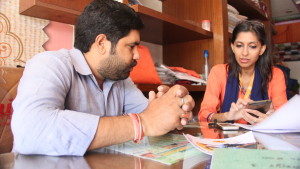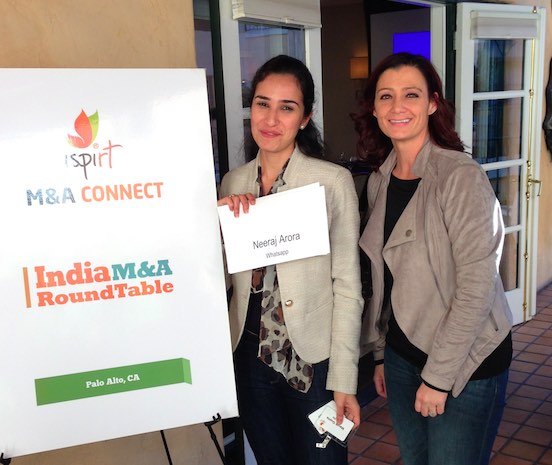# DigitalDesh spanned across 22 cities in 30 days to discover The Internet of Inside India.
Amritsar to Kanyakumari
An endeavor to study the behavioral patterns of entrepreneurs across different regions. To understand their digital business routines, their perceptions, the challenges and their desire to venture into new terrain. An important part of the activity was also to encourage & spread awareness to build a strong digital footprint online.
The journey of #DigitalDesh began from Amritsar and it was only apt that it got its initiation by meeting Jagdeep whose infectious energy highlighted the passion of a business savvy person. A lively man, who was excited to show his smartphone and share his social networking habits that he indulged in to do business with his customers.
Infact Whatsapp was largely used as a business tool because of its ease of use and the popularity by the word of mouth. The cool quotient too.
Local business owners found it easy to share pictures with their  customers, samples of new designs by textile owners to or be it the owner in Amritsar who sells religious items to his customers in foreign. A shop keeper who sells cosmetics to the local college students used it to share the new goods/purses that were sold in his showroom.
customers, samples of new designs by textile owners to or be it the owner in Amritsar who sells religious items to his customers in foreign. A shop keeper who sells cosmetics to the local college students used it to share the new goods/purses that were sold in his showroom.
The most interesting use I found of it was when the fisheries in Karwar used it to overcome language barriers and sharing the pics of fishes which is known by different names in different parts of India and across the world. Although the order was still placed on phone, the pictures were shared over whatsapp.
More savvy business owners have started using facebook pages but it was limited in numbers and even few that were looking to go the app route.
Yes many of the business owners are learning different ways of transactions, although not many of them are familiar with payment gateways, they do use online banking systems and learning to use payment wallets. Education on these will be helpful.
Email Ids – were largely used to place orders and when outlets/franchises are using to interact with their head-office. Although these are not professional ids, most of the time the personal id served both the professional and personal use. Website were still being designed by a trusted source and were given the impression that it takes a really long time to do so. Many were surprised to know about certain tools that would help them set it up in a matter of few minutes.
And yes smartphones do rule in tier 2 & tier 3 cities of India 🙂
One of the key things that I learnt as part of this drive is the need for education on the availability of tools.. lots more to be done in this area. Best part they are hungry to learn and the willingness to grow.


 You should care because there’s a good chance that (like me) you are a first generation beneficiary of the internet and have seen the transformative role it has played in your life. The way you work, learn, read, buy, communicate, travel, make friends – everything has been turned upside down. Now imagine if the internet could have that same impact on how India is governed. Imagine if the simplicity and fluidity of platforms like Wikipedia, Facebook, Whatsapp, Skype could be replicated in the citizen services that you and I use everyday – be it applying for a passport or a driving license, filing your taxes or getting your govt scholarship. Imagine what citizen services can be built on top of the biometric identification system Aadhaar, which currently at 830 million is just a stone’s throw from the billion mark. Imagine if the internet could be the same change agent in the lives of our less connected co-citizens in far off towns & villages, in the tribal areas, in remote rural corners where roads dont reach – thats what e-governance is about.
You should care because there’s a good chance that (like me) you are a first generation beneficiary of the internet and have seen the transformative role it has played in your life. The way you work, learn, read, buy, communicate, travel, make friends – everything has been turned upside down. Now imagine if the internet could have that same impact on how India is governed. Imagine if the simplicity and fluidity of platforms like Wikipedia, Facebook, Whatsapp, Skype could be replicated in the citizen services that you and I use everyday – be it applying for a passport or a driving license, filing your taxes or getting your govt scholarship. Imagine what citizen services can be built on top of the biometric identification system Aadhaar, which currently at 830 million is just a stone’s throw from the billion mark. Imagine if the internet could be the same change agent in the lives of our less connected co-citizens in far off towns & villages, in the tribal areas, in remote rural corners where roads dont reach – thats what e-governance is about. On January 23, 2015, the
On January 23, 2015, the  After an interactive session with Neeraj, we had a candid discussion with the Corporate Development attendees about their experiences acquiring Indian startups. The Yahoo and Twitter corp dev folks shared the key learnings from their recent M&As in India. Here are some takeaways for us in the Indian software product industry and for the next acquirers of Indian startups:
After an interactive session with Neeraj, we had a candid discussion with the Corporate Development attendees about their experiences acquiring Indian startups. The Yahoo and Twitter corp dev folks shared the key learnings from their recent M&As in India. Here are some takeaways for us in the Indian software product industry and for the next acquirers of Indian startups: